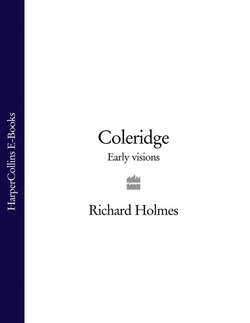Читать книгу Coleridge: Early Visions - Richard Holmes - Страница 48
4
ОглавлениеIt was an ideological confusion that was becoming increasingly evident at College Street. Under the pressure of producing their lectures, Coleridge and Southey found fraternity difficult to sustain, and financial worries increasing. Notes to Cottle show them borrowing rent money, and even begging food for their suppers. Southey found Coleridge’s endless talk, dilatory methods of composition, and general “indolence” as maddening as the fabled rain.
When Coleridge promised to stand in for the last of Southey’s “Historical Lectures”, and then failed to appear in the lecture hall, Southey was shocked into doubts about their whole partnership. Meticulous in his own habits, and obsessively precise in his working timetable, Southey felt that the Pantisocrats were let down by Coleridge’s chaotic approach to life. Even the Observer contrasted Southey’s precise style and presentation with Coleridge’s dreamy speech and “slovenly” appearance, advising him to appear “with cleaner stockings in public” and his long black hair better “combed out”.
Coleridge in turn felt that Southey was concentrating more and more on his own career, and his marriage with Edith. Having abandoned all hope of support from his own family, he was hypersensitive to the least sign of emotional betrayal from the person to whom – far more than Sara Fricker – he had committed himself at this point.
As he wrote retrospectively in November:
We commenced lecturing. Shortly after, you began to recede in your conversation from those broad Principles, in which Pantisocracy originated. I opposed you with vehemence…And once (it was just before we went in to Bed) you confessed to me that you had acted wrong. But you relapsed: your manners became cold and gloomy: and pleaded with increased pertinacity for the Wisdom of making Self an undiverging Center.23
This has something of the overtone of a lovers’ quarrel: and later, before the final breach, there were certainly tearful scenes.*
During that summer they went for several long walking expeditions together, trying to argue out their differences. Over thirty-five years later, in a Notebook of 1827, Coleridge fondly recalled the absurd intensity of one such tramp with Southey, “on a desperate hot summerday from Bath to Bristol with a Goose, 2 vls of Baxter On the Immortality of the Soul, and the Giblets, in my hand.”24
In June they went on a tour to see Tintern Abbey and the Wye Valley, this time accompanied by Joseph Cottle (trying to smooth matters over between his two poets), and Edith and Sara. They lost their way, were benighted, and then had a row at the inn. The Fricker girls each supported their own fiancés. Again, Coleridge recalled the incident with painful precision.
You had left the Table and we were standing at the Window. Then darted into my mind the Dread, that you were meditating a Separation. At Chepstow your conduct renewed my Suspicion: and I was greatly agitated even to many Tears. But in Percefield Walks you assured me that my Suspicions were altogether unfounded, that our differences were merely speculative, and that you would certainly go into Wales. I was glad and satisfied. For my Heart was never bent from you but by violent strength – and heaven knows, how it leapt back to esteem and love you.25
